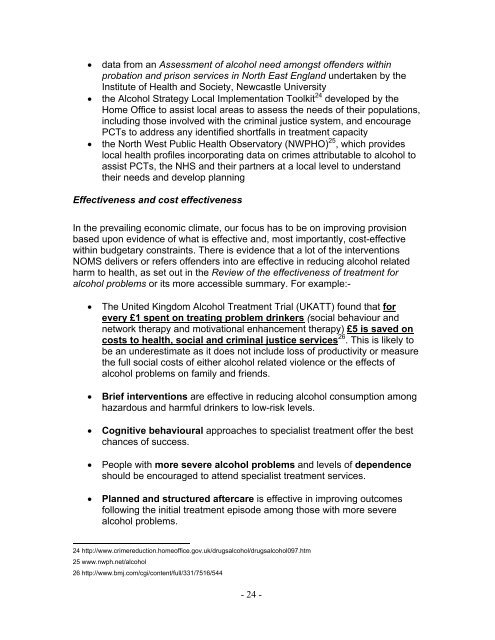10py0mL
10py0mL
10py0mL
- No tags were found...
You also want an ePaper? Increase the reach of your titles
YUMPU automatically turns print PDFs into web optimized ePapers that Google loves.
• data from an Assessment of alcohol need amongst offenders within<br />
probation and prison services in North East England undertaken by the<br />
Institute of Health and Society, Newcastle University<br />
• the Alcohol Strategy Local Implementation Toolkit 24 developed by the<br />
Home Office to assist local areas to assess the needs of their populations,<br />
including those involved with the criminal justice system, and encourage<br />
PCTs to address any identified shortfalls in treatment capacity<br />
• the North West Public Health Observatory (NWPHO) 25 , which provides<br />
local health profiles incorporating data on crimes attributable to alcohol to<br />
assist PCTs, the NHS and their partners at a local level to understand<br />
their needs and develop planning<br />
Effectiveness and cost effectiveness<br />
In the prevailing economic climate, our focus has to be on improving provision<br />
based upon evidence of what is effective and, most importantly, cost-effective<br />
within budgetary constraints. There is evidence that a lot of the interventions<br />
NOMS delivers or refers offenders into are effective in reducing alcohol related<br />
harm to health, as set out in the Review of the effectiveness of treatment for<br />
alcohol problems or its more accessible summary. For example:-<br />
• The United Kingdom Alcohol Treatment Trial (UKATT) found that for<br />
every £1 spent on treating problem drinkers (social behaviour and<br />
network therapy and motivational enhancement therapy) £5 is saved on<br />
costs to health, social and criminal justice services 26 . This is likely to<br />
be an underestimate as it does not include loss of productivity or measure<br />
the full social costs of either alcohol related violence or the effects of<br />
alcohol problems on family and friends.<br />
• Brief interventions are effective in reducing alcohol consumption among<br />
hazardous and harmful drinkers to low-risk levels.<br />
• Cognitive behavioural approaches to specialist treatment offer the best<br />
chances of success.<br />
• People with more severe alcohol problems and levels of dependence<br />
should be encouraged to attend specialist treatment services.<br />
• Planned and structured aftercare is effective in improving outcomes<br />
following the initial treatment episode among those with more severe<br />
alcohol problems.<br />
24 http://www.crimereduction.homeoffice.gov.uk/drugsalcohol/drugsalcohol097.htm<br />
25 www.nwph.net/alcohol<br />
26 http://www.bmj.com/cgi/content/full/331/7516/544<br />
- 24 -



